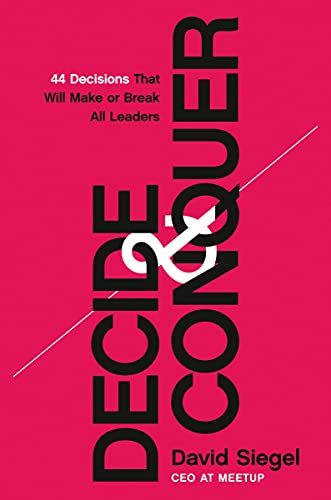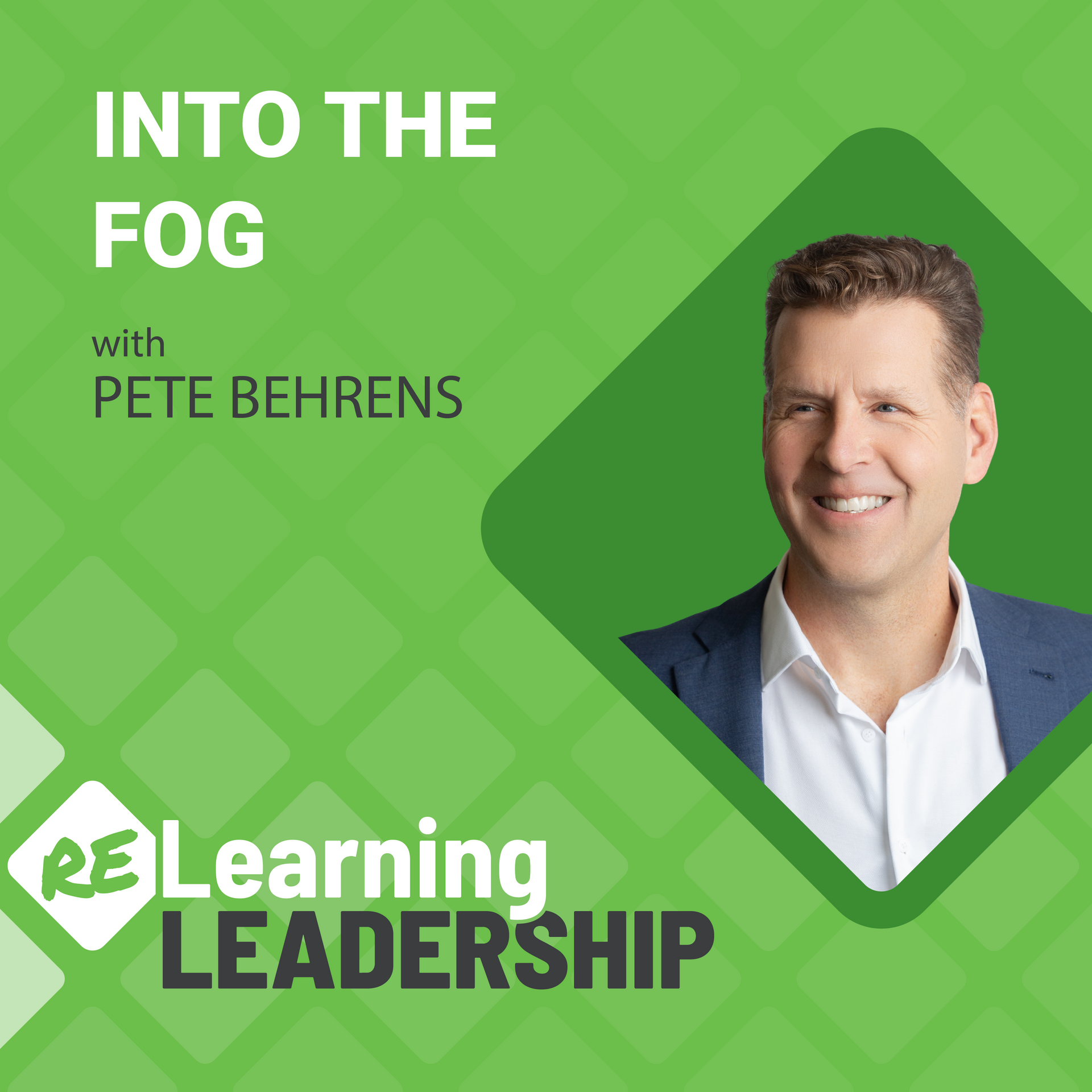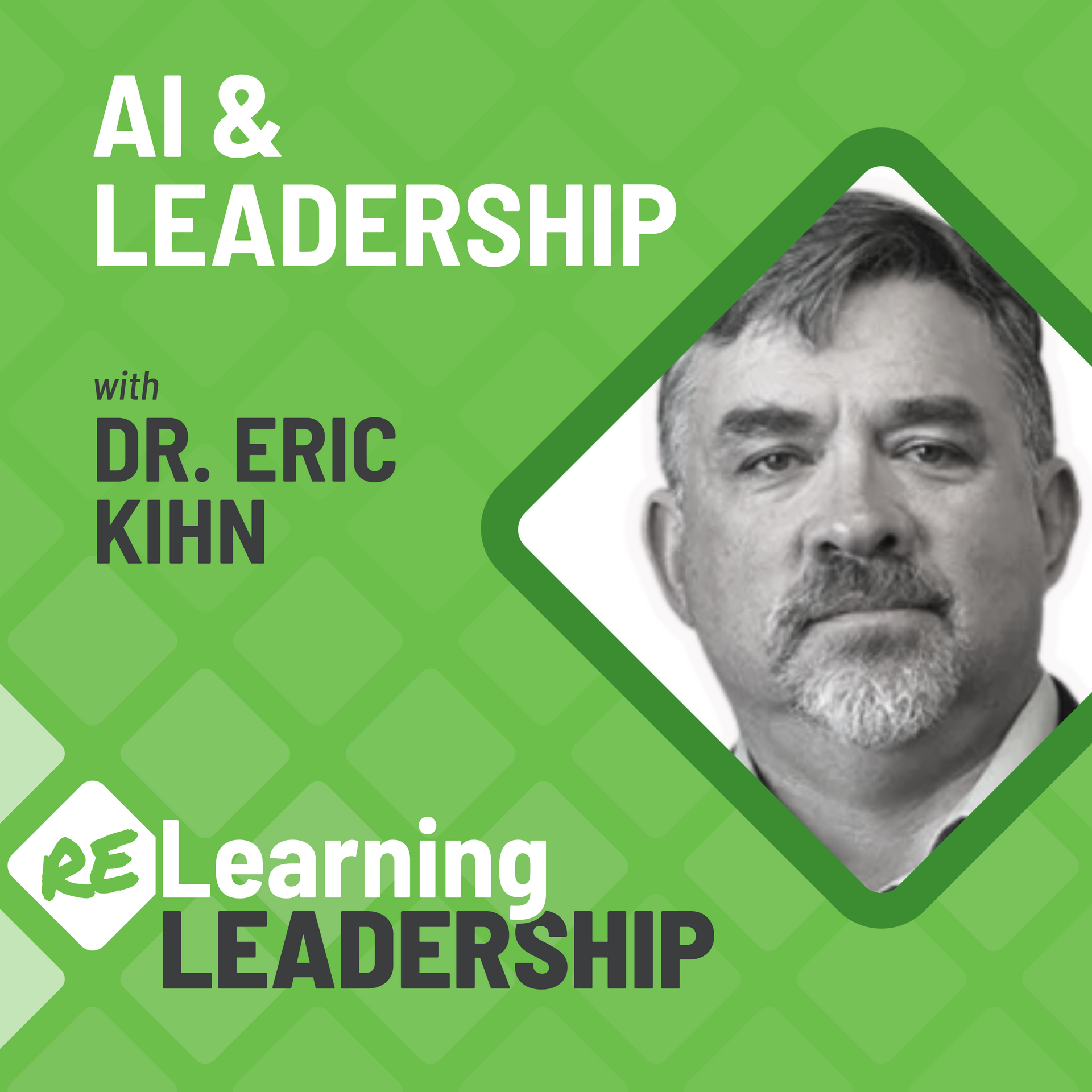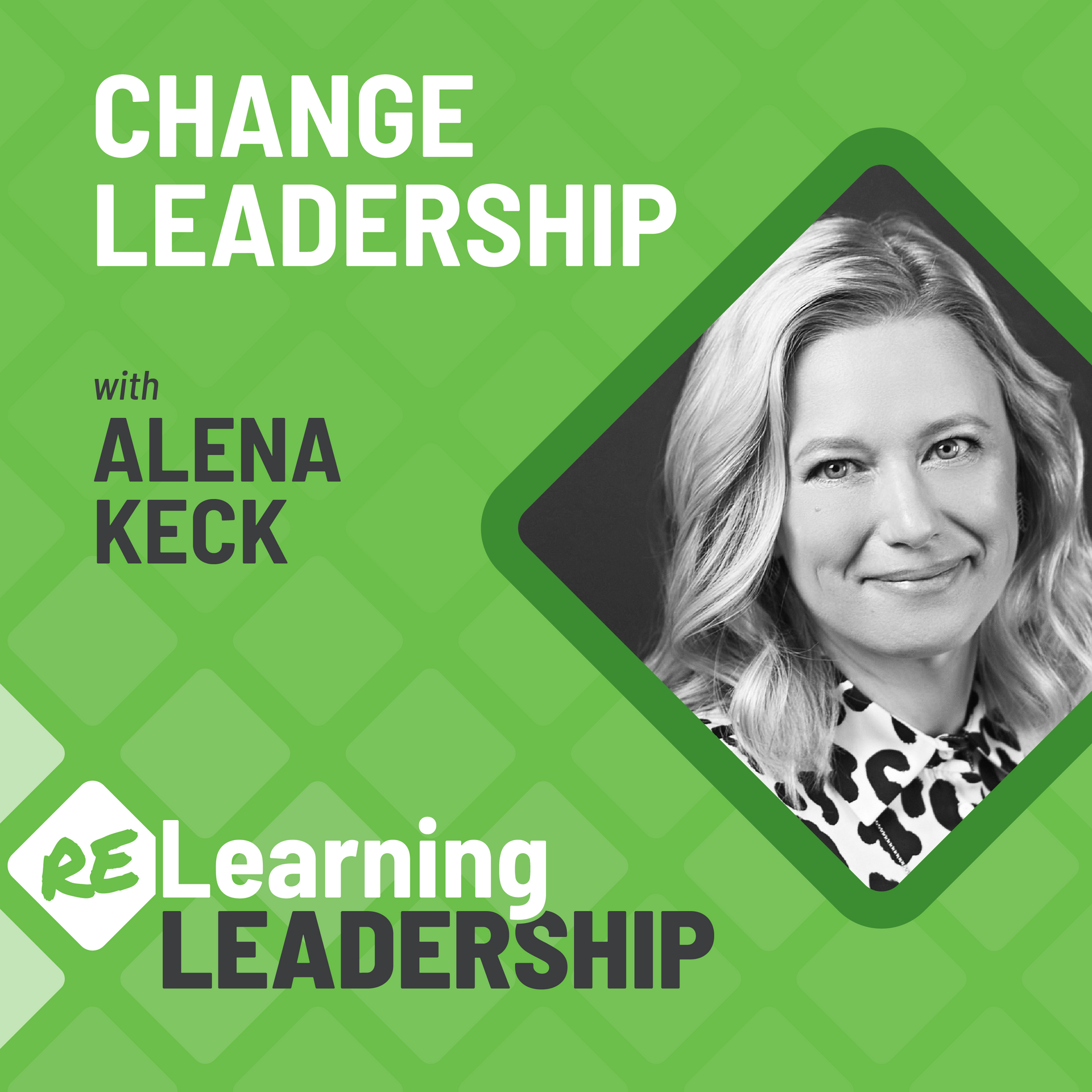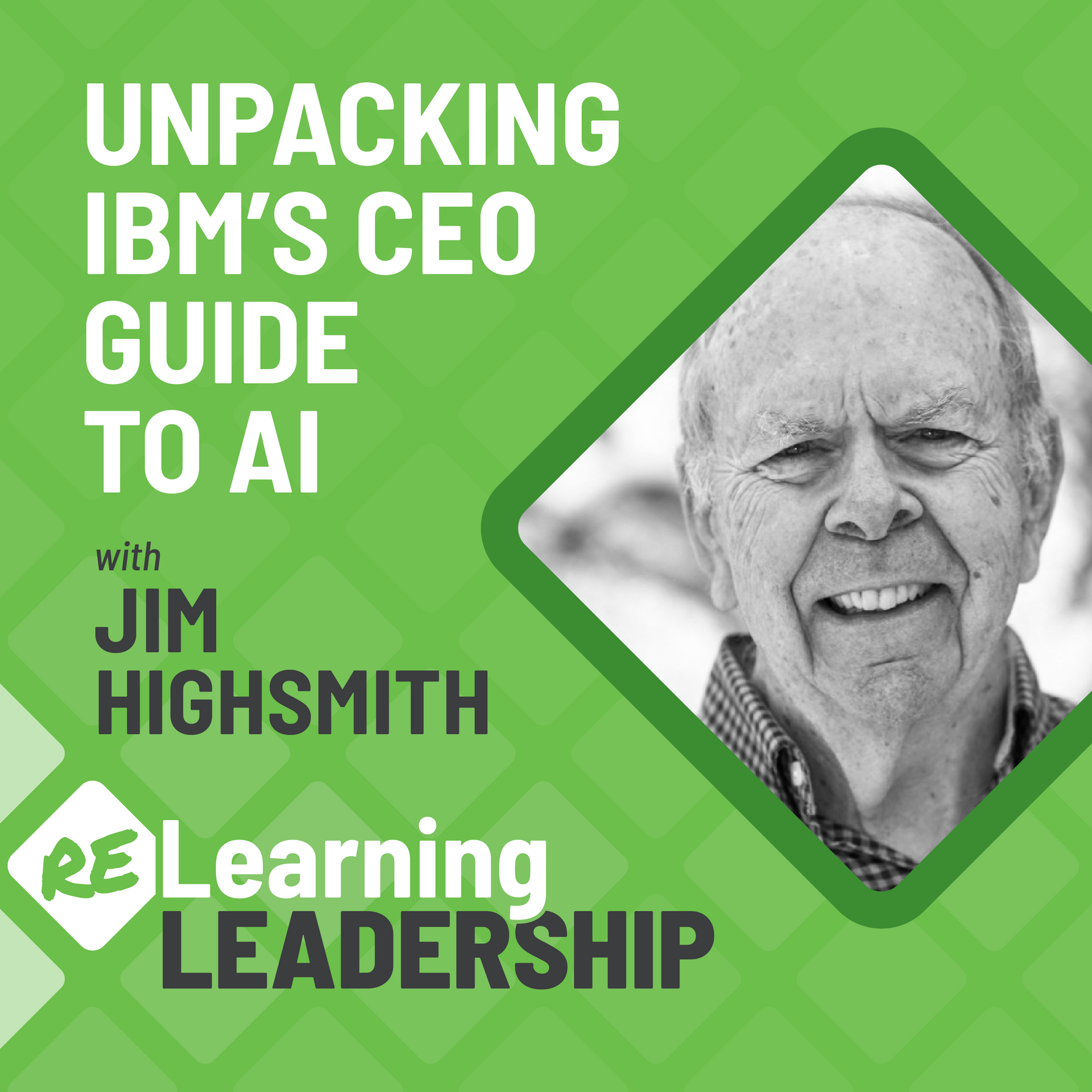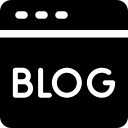24: The Power of Community
How can leaders tap into the power of community?
Community is so much more than getting together with friends and family. Through the pandemic, we relied on community to stay connected in a world that required us to be physically separated. As the world begins to reopen community might inspire the next phase of your work or life journey.
Guest David Siegel, CEO of Meetup, joins Pete to talk about how leaders can improve themselves by leveraging the power of community.
David Siegel, CEO
David Siegel is the CEO of Meetup, the largest platform for finding and building local communities.
He has 25 years of experience as a technology and digital media executive leading organizations through innovative product development, rapid revenue growth, and digital traffic acceleration.
Connect with David
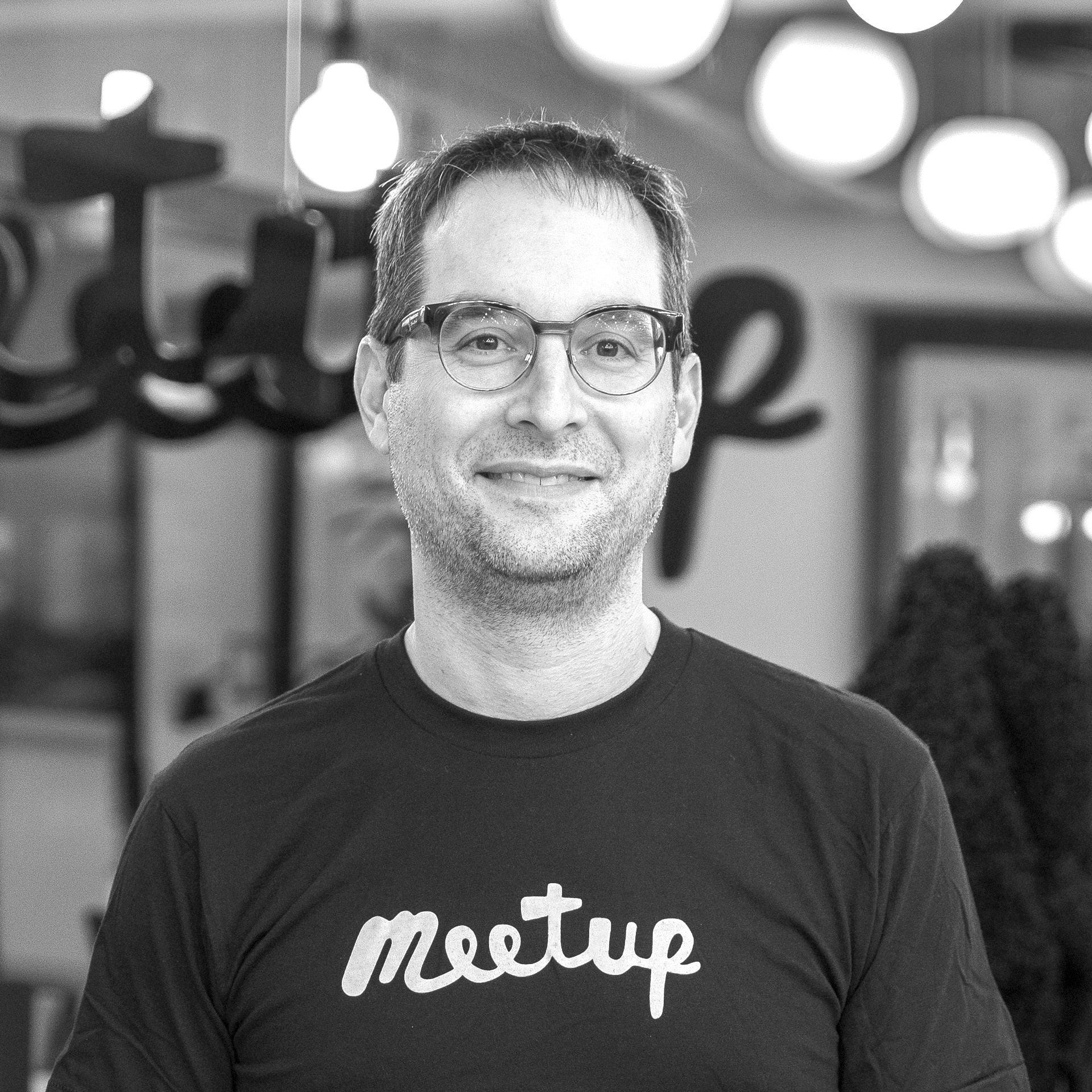
David's new book: Decide & Conquer
Check out David’s recently released book on his leadership journey at Meetup through the WeWork melee.
WeWork owned Meetup from 2017 to 2020. Through Decide & Conquer, David shares the decision framework he used as he took over as CEO of Meetup as he guided the organization through one of their most tumultuous times in the company’s history.
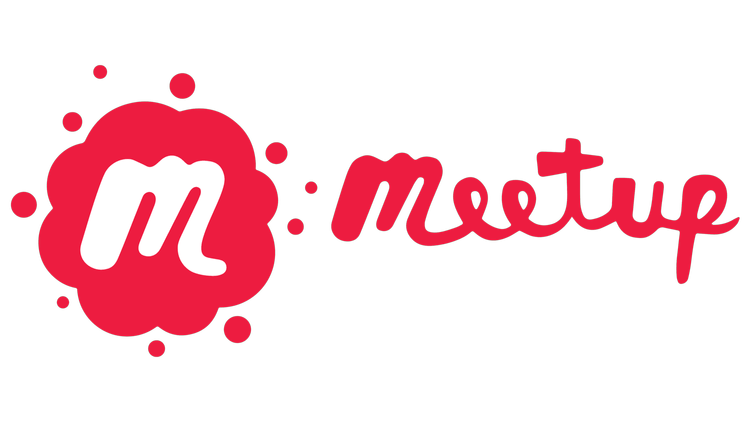
Join (or start) a Meetup
If you haven’t found a community to focus your passion, maybe you need to create it. Community is not just something you join, but something that requires leadership. So I encourage each of you to find a way to create community for others.
Relearning from this episode…
It was a pleasure to riff with David in this episode. I truly felt like two friends at a bar, sharing a drink. I can imagine his down-to-earth leadership style is probably one of the keys to his success. Based on this conversation, I don’t think I would mind working for David.
What have I (re)learned in this episode?
First, community is a lot like agility. The big bang is a myth. Developing community takes intention, focus, repetition, and patience. Leaders who take the long-term view will outpace the average.
Second, community is unpredictable. While we may have a particular set of intentions for gathering, resulting outcomes, if given a chance, will likely and vastly outweigh the goals of the group.
Third, community is powerful. I personally witnessed last summer the power of community through Black Lives Matter and Moms Demand Action. Yet leaders in any movement or organization can harvest the multiplier impact of those passionate and dedicated members in their community.
And finally, community is personal. If you haven’t found a community to focus your passion, maybe you need to create it. Community is not just something you join, but something that requires leadership. So I encourage each of you to find a way to create community for others.
We Celebrate Joy Zimmerman’s Milestone
Joy Zimmerman, the creator of the music you hear on this podcast, is celebrating an award-winning album this summer. The Canvas Before Us reached Top #8 on the International Folk Chart!
Visit Joy Zimmerman Music
For this episode, I dove down into her archives to pull out one of my favorites,
If You’re Late to the Party.
People are often shy to act because falsely they believe that all of the opportunities have passed and all of the communities have already been created and everyone else is already attending. Well, here’s your chance. Find your angle, and attract your crowd.
Enjoy If You’re Late to the Party.
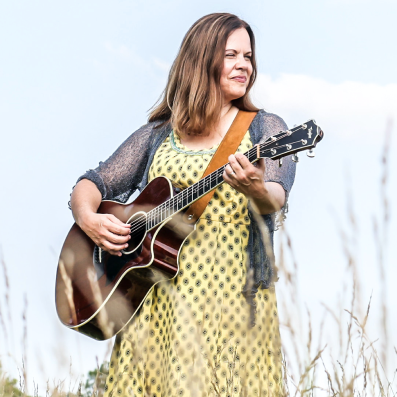
Episode Transcript
Pete Behrens:
How can leaders tap into the power of community?
Welcome to another episode of Relearning Leadership, where we explore a specific leadership challenge and break it down to help improve your leadership, your organization…and even your personal life.
Today, I am joined by David Siegel, CEO of Meetup, hosting the largest local community platform, to share how leaders are leveraging the power of community to drive value in their organizations.
David Siegel:
What's happening now is thousands—not even hundreds, but thousands of companies have full-time community leaders. It’s these zealous users that have, you know, 100 to 1, sometimes 1,000 to 1 potential than some random person that may have responded to an email at some point.
Pete Behrens:
My name is Pete Behrens. Thank you for joining us today. Let’s dive in!
Welcome, David!
David Siegel:
So great to be here! Excited to learn from you during this conversation.
Pete Behrens:
So, before we dive into the power of community, I'd like to know just a little bit more about you personally.
David Siegel:
Me, personally? Okay, sure. So, we're going to be talking about community, so I might as well start with saying that in my life, I've been surrounded by community, partially because my parents were always very active in their synagogue. They were very active in PTA and parent associations. I grew up in an area where if, God forbid, someone passed away, they didn't have to make a lunch or dinner. Food was delivered to their home for, like, the entire next month by neighbors and friends, you know, etc. And people were there for each other's celebrations and for challenges. So
I was a part of, like, this really rich community. I'm still part of a really rich community today, and I see how much has kind of enriched my life. And I think that when I look at other people who have more loneliness, you know, I see the challenges.
Pete Behrens:
It sounds like this is quite personal to you. Community, family, and religion. This just isn't just something you do. It sounds like it goes much deeper than that for you. Is that a fair thing to say?
David Siegel:
I mean, it really is. Like, I feel like my destiny was to be able to work at Meetup. And I just am so lucky to have had that opportunity. I mean, early in my career, I actually worked in human resources. I was a human resources partner. So I've always, like, championed elevating people and how important treating employees and treating people are. And the impact of people and connections, you know, that can be made. So it's really just kind of been a natural evolution. And, you know, you can't beat luck, and I got very lucky to have gotten a phone call that just said,
“Hey! David, would you be interested in becoming the first outside CEO of Meetup?” And I'm like,
“Meetup? I love Meetup! Yes, absolutely.”
And now I'm a Meetup organizer. And when I meet with Meetup organizers and meet up with Meetup members, I'm wearing, let's say, my Meetup t-shirt or whatever and going to a Starbucks, and someone says,
“Oh, you know, you also are a Meetup member!” I'm like,
“Yeah, I am!” And, you know, I don't tell people, necessarily, what my role is, but I have people share with me the stories of how that impacted their lives. And it's just, wow, you know, the impact that we've had on so many different people is just so motivating to me and all of our people. It gives Meetup a real unfair advantage in helping to recruit and retain, like, amazing people, because our mission and our impact is so strong.
Pete Behrens:
Well, while you said luck, I’d say a combination of experience and persistence. You know, our community—I mean our agile community—has leveraged Meetup from as long as I can remember, starting out as a coach probably 20 years ago. It’s likely been one of the constants as everything else has changed around us. It's interesting, though—you talk about this as almost a health thing. You touched on loneliness earlier. Could you share a bit more about that?
David Siegel:
Yeah, you know, two years ago, when the pandemic was first—people were made aware almost exactly two years ago—we didn't allow non-in-person Meetup groups. Everything was about in-person. Everything was about IRL. And that was kind of what we stood for. In fact, we had many different groups that said,
“We want to create Zoom groups!” And that was the number one reason why we rejected organizers, because they wanted to create cross-geographic regional Zoom groups. Once the pandemic hit, and we saw in China our numbers going down, like, 95% in terms of people attending events and RSVPs. Italy, same thing. Then Europe. “Like, that's never going to hit the US!” Okay, clearly it did. We realized—we got everyone together. We said we have to really focus on what our mission is. Our mission is not about IRL. We need to pivot. Our mission is about connections. It's about helping people to, you know, decrease the loneliness epidemic, helping people to learn more, help more people to grow. And since the pandemic started, we've had close to 5 million different online events. Today we're about 71% in-person and 29% online. And there's big differences by geography. And like you said, Pete, it's become more important than ever. Because during this time when loneliness is even greater where isolation is even greater, Meetup can help people. But at the same time, after two years of Zoom fatigue, Meetup is also here to get people back out and meeting people. And, you know, we're hopefully here for those lows, and also for the joys and the highs.
Pete Behrens:
It would be interesting to map the impact of the pandemic through Meetup registrations. Now, you used the term
IRL a couple of times. Do you mind defining that for us?
David Siegel:
Well, I'm sorry!
IRL stands for
in real life,
which is the idea that the power happens when you're in-person as opposed to, kind of, when you're more remote. Yes.
Pete Behrens:
So when will we get to visit the Meetup Metaverse?
David Siegel:
You know, it's an interesting philosophical question! I hope never. I genuinely believe that, yes, we allow for online, we'll allow for some Meta version, whatever that looks like. But that we are inbred, like, in our DNA going all the way back to Paleolithic and Neolithic man, that the way that hunters and gatherers survived was with community. Someone hunted, someone gathered. You needed a community of people. Cavemen needed communities of people to live in, or else they wouldn't survive. And that's, like, inbred in our DNA, and that's kind of who we are. And that’s hopefully never going to change. At least, I hope it doesn't.
Pete Behrens:
You’re highlighting a couple of really important points here. The first one is this in-person and the virtual, and I know we felt a similar tug. I said, at one point, I would never teach some of our classes virtually. And then COVID hit us. And now I actually see there's an advantage, in some ways, of teaching virtually. Not just with less travel, but actually better, sustained learning.
The second thing I see you emphasizing is this importance of growth. I’m wondering if you see community as more than just connection, that there’s likely something about purpose and growth. Do you mind sharing more about that?
David Siegel:
Yeah, sure. So, one of the things that I just deeply love is that a community can have a certain purpose, but the amount of things that that creates could end up being so different than the purpose. Here's what I mean. So, I'll tell you about the story of Oscar Acosta. He was sitting on his couch kind of all day long, playing video games, quite lonely. He was told by his brother, joined a Meetup group. He joined a group for rock climbing. And the purpose, the mission, was to help people to learn how to rock climb and build rock climbing relationships and then go drinking afterwards. And it was great! He did that ten years ago. He's had 980 events since then, and he's had, like six or seven marriages that ended up coming out of, like, this rock climbing group. So the reason I give that example to your question is that every Meetup group has a purpose. Sometimes the purpose is career networking, sometimes it's agile learning, sometimes it's learning a new technology, sometimes it's hiking. It could be anything, so it could be a support group. Who knows what it is? But the things that end up coming out of it end up being so different, oftentimes, than what the actual purpose is. So, for example, a friend of mine that I met—Meetup organizer—he has two different groups. One group is a bowling group. And in the bowling group, the goal was to enjoy bowling. And the other group they created was a career networking group. He ended up getting his two jobs from his bowling group, and he ended up finding, like, his best friend at the networking group. And, like, that's the serendipity that happens when you're building relationships. But it doesn't happen if it's just this tactical-type action. But it's about the relationship. And the relationship that results in this, you know, beautiful serendipity of, kind of, things happening. Which, you know, is part of the purpose, like you described.
Pete Behrens:
Wow. Those are awesome stories. They’re illustrating to me the power of collaboration and co-creativity we often focus on in our agile values, where we’ll see outcomes greater than the sum of the parts. So, because this is a leadership podcast, I want to dive into the difference between the successful communities and, I don’t know, maybe, the more latent communities. What are you finding makes that difference in the leaders who create and curate these more successful thriving communities?
David Siegel:
Okay. I'll share two or three important ingredients to a successful thriving community, and then we could, you know, riff based on that. Hopefully that works.
Pete Behrens:
Sure!
David Siegel:
Okay. Here we go.
So, the first is that oftentimes a Meetup organizer—I'll give Meetup as an example, though it relates to, I think, other community platforms as well, not just Meetup. So, sometimes you let perfect be the enemy of good. And that happens in product development, certainly. And they form a group, and the group, you know, might have 10 members, 20 members, 30 members, 50 members, 100 members. And they're so nervous about that first event being this, like, amazing event that's just going to, like, transform everyone. And the challenge with that is that they—inertia could set in. And what we found is sometimes Meetup organizers create groups, have people join, and then never host a first event! [Laughs] And that's not a way to develop a great community, like, it can't just be about, you know, Slacking back-and-forth or other things. You have to actually have some kind of meaningful event where you show up to, and you do things together. You have a shared experience. So I think the first bit of advice I would say is—don't aim for perfection. Create your group. Within 30 days you create your group, have that first event. Plan that second event no matter how many people join. You're going to get more people the next time and more people the next time after that. So that's kind of point one. The second is—
Pete Behrens:
Let me pause on that point here for just a second before we move on, so we can riff. I think what you're bringing up is a very agile principle. Avoiding this big design up front and trying to get it right from the beginning versus these more frequent smaller events where you learn and grow. I like to use that metaphor of investing. It’s similar to trying to time the market with these big investment buys, versus—you know, I think most investors improve returns through dollar-cost averaging, investing on a regular rhythm. So it sounds like smaller steps are also a key success for community growth.
David Siegel:
Beautiful example. It really is. And kind of taking that MVP, Lean Startup, Agile approach is super important in community building, just like almost every other aspect of life, frankly. So that's one. The second is that after you have that—so let's talk about this preview event. After you have that first event, understand that even if it's not a success—let's say only three people show up. Like, that's three people more than zero! And, like, the way that these communities that have succeeded, the groups that have 5 thousand, 10 thousand, 20 thousand people, that get hundreds of people to show up—their first event, they probably had three or four people show up. It's important to have persistence. The way that you're an effective community organizer is if you're resilient and you don't just think,
“Oh, I had something. It wasn't so great. Now I don't know if I should—” No! Do a second one. Learn from that experience, and then try a third time. Now if, after three, it's really not going anywhere, different story. But you should be able to see, kind of, slow and steady growth in each of those steps. And that's also really important context-setting, because it takes time to build these really thriving-type communities. Bigger is also not necessarily better, too.
Pete Behrens:
Yeah, that last comment is a really great point and one I’d like to add onto. One of my favorite communities was actually barely a community at all. You know, we created it ourselves, and it lasted about four years. But it was really just two of us who loved meeting together and talking business. And we wanted to form a support group. So we each asked one other person to join to create a group of four. We met monthly, and we helped each other with our businesses and sales and marketing and, you know, support and all that stuff. But we often discussed,
“Should we grow our group?”
And there was the fear that if we did, we would lose what was most valuable. You know, it was that intimacy and connection that we developed. In fact, we’d even include our spouses once in a while for dinner. So, to me, that is community. You know, bigger isn’t always better.
David Siegel:
We have a problem, more in America than probably any other country, but, like, about this, you know, the SUV mentality. And the bigger-is-always-better-type thing. And in reality, the average Meetup event has eight to nine people. That's the average meet-up event size. And, I mean, some have, you know, twenty, and some have four. And the smaller groups could be, as you gave as an example, like, so powerful, so meaningful, so deeply engaging that they should in no way be discounted. And bigger groups could be even more superficial and intimidating, so it really varies. It's important to have that mindset, like you said.
Pete Behrens:
The other thing I want to touch on here is that difference between personal communities and corporate communities. Is Meetup something that—if I'm a leader inside of a company, is this something I can use as an internal tool? And do you see that happening, or is this pretty much designed for external, social, and learning platforms?
David Siegel:
The fastest growing area within Meetup is companies who are using Meetup to create communities of zealous users around their products. So, for example, Google has hundreds of Meetup developer groups. Amazon, AWS, has tons of different groups that they sponsor. Large hiking companies, the
REIs
of the world, etc., will have groups. You know, a book company publisher might have book club-type groups, also, that they sponsor. WordPress has a very large and thriving community. Starbucks has 50 to 100 communities on our platform as well, where people are meeting in Starbucks stores, you know, as part of it, to grow the Starbucks brand even further. So it's a very big part. In fact, I would say that, much like ten or fifteen years ago, people didn't have a head of social media and multiple people on the social media team. And it was like,
Oh, hey, marketing person! Just take on some social media on the side.” What's happening now is thousands—not even hundreds, but thousands of companies have full-time community leaders. Just like they had social media leaders before, now they have full-time community leaders. Sales force, full-time, large number of people who are all focused on building community. And I think companies realize that it's
these zealous users that have, you know, 100 to 1, sometimes 1,000 to 1 potential impact than someone, you know, some random inactive person that may have responded to an email at some point. So, yeah, I think it's definitely a trend, and it's exciting. CMX is one of the biggest platforms for it, and the number of people that go to CMX conferences who are community leaders just grows every year.
Pete Behrens:
Wow. Yeah. It sounds like, for leaders, whether you're in charge of a community of practice or whether you're actually working with customers and other businesses, it sounds like this could be something that could help connect those corporate communities. Another key agile principle here: get close to your customers and understand what they're looking for.
I want to switch gears here for just a minute and touch on the WeWork story. For listeners who are not familiar with this story, WeWork purchased Meetup in 2018, and then it was eventually sold off during the very public downfall of WeWork. But David, what did you take away from that journey? What did you learn through those events?
David Siegel:
Wait, WeWho? [Laughs] Sure. And actually, WeCrashed is an Apple show that's coming out in, I think, a couple of weeks. So people will get even more insight, as Anne Hathaway, I think, plays Rebecca Neumann, who is Neumann's wife.
Pete Behrens:
That is awesome. So who plays David Siegel? That's what I want to know! [Laughs]
David Siegel:
Hopefully I will not be in that show! [Laughs] We will see! Although it was fun watching the WeWork Hulu documentary.
I wasn't in it, but there were, like, a lot of friends, and other executives were in it. And as I'm watching and, like, texting different friends, being like
“Oh, my god! Like, look! There's you hitting the giant bong, or whatever it is, and, you know, dancing like crazy at some big thing.” So here's what I would say about WeWork and the learning. So, number one is that—I think people know this, but one of the most important ingredients to mergers and acquisition success is cultural alignment. And there was just a massive lack of cultural alignment between WeWork and Meetup. WeWork was all about one mantra, really: grow, grow, grow. And even though they said things like their goal was to cultivate the world's consciousness and all these other very highfalutin concepts and ideas, at the end of the day, it was real estate. Grow real estate, you know, and lever up to wazoo so that the valuation keeps increasing above the 47 billion dollars it was worth.
Meetup, however, was about making and building meaningful connections. We were incredibly mission-vision in all of our ways in which we approached our decision-making. And at times that meant not growing. At times, that might even have meant kind of pulling back from growth in order to create much better experiences for members and organizers. And that was the focus, so when the two hit, collided, it became really bad. There were a number of people that quit at MeetUp because they didn't like some of the shenanigans and inappropriate things that were allegedly being done, you know, at WeWork from a number of different perspectives. And that was stressful because it's, like, we couldn't control that. All of Meetup’s employees had stock in WeWork, so they were intrinsically connected, financially, kind of, to WeWork’s success or failure. So it added a heavier kind of element to it. And Adam was, you know, very engaged, extremely engaged, overly engaged in MeetUp right after the acquisition. Because he comes from a kibbutz background, he does deeply believe in community, and he just wanted MeetUp to help WeWork as best as possible. But sometimes in life, fast is slow and slow is fast, and if you try to go too fast to try to make something happen, you end up losing a couple of years. And, you know, that's some of what happened.
Pete Behrens:
Well, you're reminding me of the balance between performance and health. And so, while performance is important, not at the detriment of health. And it sounds like, maybe, Meetup had more of that health bias, while WeWork was on the performance side. So, putting the spotlight back on you, how is your leadership changing over these past couple years through this cycle? What do you see in yourself today, maybe, that is different than the David Siegel from, I don’t know, three, four years ago?
David Siegel:
Sure. I definitely have evolved my style. Maybe devolved my style; it depends on what perspective
you you would take. If
devolving is a word—I don't even know! So, I would say in two ways that won't sound great on paper, but they're true, and truth is always great. So, one challenge that I've always had in my career is that I've always wanted to be liked, kind of a little bit too much. And I always wanted to be as, like, nice a person as I possibly could be, because, like, I want to be treated nicely. So treat other people nicely. Treat other people the way you want to be treated. And taking over Meetup was so deeply difficult because the company was also not run well at all from a financial perspective. We were losing tens of millions of dollars under WeWork. It was really a problem, was not sustainable. So we had to make a lot of very hard choices. A lot of those choices aren't nice on paper, but I like to, kind of, now talk about the difference between nice and kind. And sometimes the kindest thing you could do is just tell someone they're not doing the right job and they might want to look somewhere else and work somewhere else. Sometimes the kindest thing you could do is to enable a company not to end up going under by having to let quite a few people go because of the pandemic or because of financials that don't actually work. And in the beginning, you know, you take it so personally when people, you know, post different things about you on Glassdoor and other areas. And it's very painful. You try to be as thoughtful and caring as you possibly can. For example, when we did those things, we had recruiters from other companies actually present so that they would be able to interview people who we might be looking for another jobs and created spreadsheets to help people. All these other things. But I think one way that it's evolved is that I care much more about being kind than being nice, and I recognize the big difference, actually, between the two. And it's not about being, kind of, well-liked, because sometimes that makes for much less effective leadership.
Pete Behrens:
Yeah. Tough love. Well, I can imagine you can take one or two clues from your role as a dad. You know, you can't always be best friends with your kids.
David Siegel:
Extremely well said. Extremely. There really is. One day I want to write an article about, like, similarities doing parenting and managing. It's incredibly true. The second thing I would say is I've always deeply believed, because of my HR background as well—and, like, everything is about empowerment. Empowering people, having people take ownership of what they're doing. And it's really important: push decision-making down, decentralized decision-making. But in times of crisis, you can't do it. And Meetup was in crisis mode for quite some time. And I, frankly—when I first started, I was overly empowering, and everyone was going in different directions, and people were doing things that weren't really driving the flywheel. They were outside the flywheel. They were outside of everything, frankly. And I became a much more didactic—not in the
how but in the
what.
And normally I like to start with just the
why and let other people figure out the
what and the
how.
But I think I pushed a little bit differently than I have in the past, in terms of,
“Here's the
why, and here's the
what. You figure out the
how.” As opposed to saying,
“Here's the
why. You figure out both the
what and the
how.” And that's, you know, counter-intuitive, perhaps, but actually really important in a change management situation.
Pete Behrens:
I love your self-awareness and what we call situational agility. To be able to step into what we call that
achiever mindset and more assertive power style, driving what needs to be done. Leadership is a lot more than delegating and just letting go.
You mentioned writing an article about parenting and leadership, but I believe you’ve actually written a much longer-form article, AKA a book! Do you mind giving us a sneak peak of what we can expect from your upcoming book?
David Siegel:
Okay, sure. The book is out March 8th. So, you know, the book is called
Decide and Conquer, and it goes through, kind of, the journey of how I and others on the team helped to make decisions that drove Meetup to succeed, despite WeWork. To succeed during the sale, and then to succeed during the pandemic. And, you know, we all make thousands of decisions every single day. Even not making a decision is making a decision. In fact, Theodore Roosevelt really once said,
“The best decisions are good
decisions, second best decisions are bad decisions, and the worst decisions are no decisions.”
And I realized that so much of, kind of, my personal life and professional life is about decision-making. So the book is about how leaders and anyone could kind of make smarter decisions, you know, around personal and business. And, you know, you can get it at decideandconquerbook.com. So, you know, thanks for letting me mention it!
Pete Behrens:
Yeah. Well, coming from somebody who wants to be liked, a strong family man,
Decide and Conquer feels a little authoritarian, if I might say.
David Siegel:
It's a strong name, and, you know, it's funny—when we shared a bunch of different names with Meetup employees, they didn't love that name, actually. Because it feels too ego-driven and too strong and too, kind of—that's a problem. I
personally believe that decision-making is so darn important that it truly can be the difference between being effective and being far less effective. And understanding your biases can really drive whether or not you conquer, you succeed, or you fail. And I think
Decide and
Conquer just sounds a little bit better than, you know,
Decide and Succeed. And a nice play off of
divide and conquer.
So, yeah. We went for it, and, you know, so far, so good.
Pete Behrens:
Well, David, I just want to say thank you for sharing your story with us today.
David Siegel:
Thank you so much, and really loved being a part of it.
Pete Behrens:
It was a pleasure to riff with David in this episode. I truly felt like two friends at a bar, sharing a drink. I can imagine his down-to-earth leadership style is probably one of the keys to his success. Based on this conversation, I don’t think I would mind working for David.
What have I (re)learned in this episode?
First, community is a lot like agility. The big bang is a myth. Developing community takes intention, focus, repetition, and patience. Leaders who take the long-term view will outpace the average.
Second, community is unpredictable. While we may have a particular set of intentions for gathering, resulting outcomes, if given a chance, will likely and vastly outweigh the goals of the group.
Third, community is powerful. I personally witnessed last summer the power of community through Black Lives Matter and Moms Demand Action. Yet leaders in any movement or organization can harvest the multiplier impact of those passionate and dedicated members in their community.
And finally, community is personal. If you haven’t found a community to focus your passion, maybe you need to create it. Community is not just something you join, but something that requires leadership. So I encourage each of you to find a way to create community for others.
Thank you. And hang on past the credits to enjoy another song from Joy Zimmerman.
Relearning Leadership is the official podcast of the Agile Leadership Journey. It’s hosted by me, Pete Behrens, with analysis from our global Guide community. It’s produced by Ryan Dugan. With music by Joy Zimmerman. If you loved listening to this podcast, please leave us a review. And visit our website, relearningleadership.show, for guest profiles, episode references, transcript, comments, and more. And to (re)learn more about your own leadership, visit us at agileleadershipjourney.com.
This season, we are celebrating Joy Zimmerman’s award-winning album, The Canvas Before Us. However, for this episode, I dove down into her archives to pull out one of my favorites, If You’re Late to the Party.
People are often shy to act because they falsely believe that all of the opportunities have passed and all of the communities have already been created and everyone else is already attending. Well, here’s your chance. Find your angle, and attract your crowd. Enjoy
If You’re Late to the Party.
Explore:
Recent Episodes

